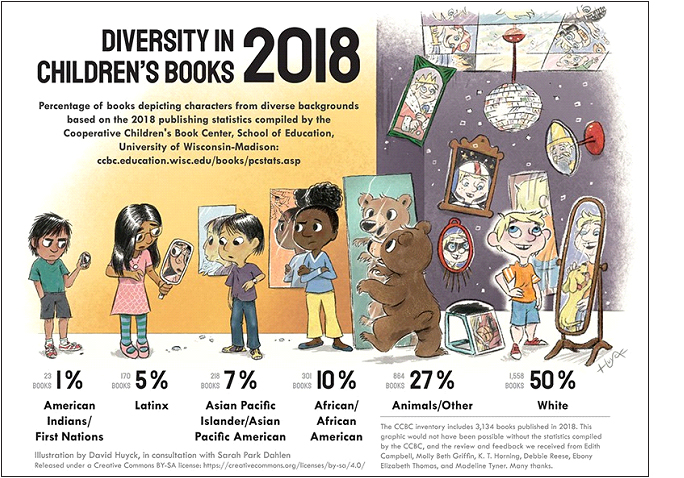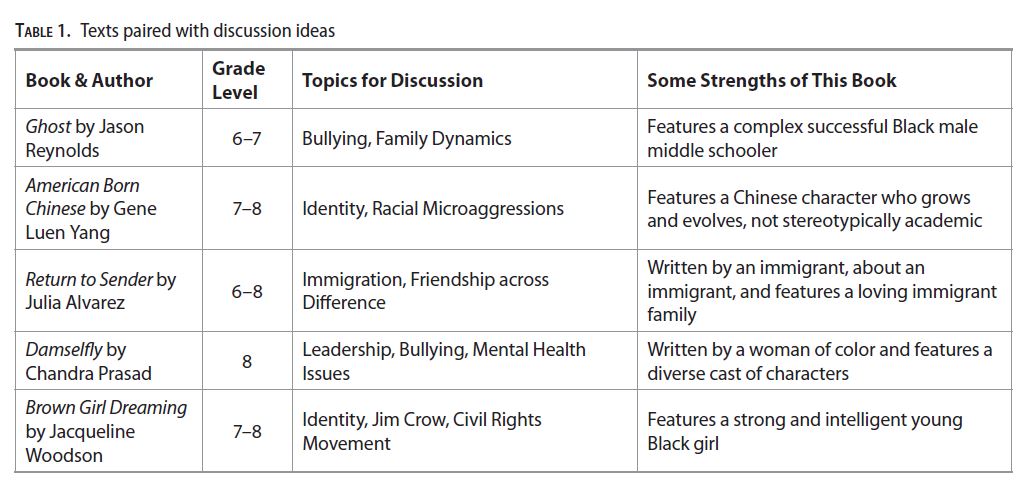This is an excerpt from Lorena Germán’s article in the March 2020 Voices from the Middle. Read the full article.
Reading and Reflections
Because reading is a means of self-affirmation (Bishop, 1990/2015), we have to think about what messages we are sending with the choices we make in text selection as well as topic of study. We must create reading experiences where students can see themselves as part of the larger human experience. We know this is true for White students. About half of children’s books published in 2018 featured White main characters (Huyck & Dahlen, 2019). The same cannot be said for Children of Color.
In her eternally referenced and powerfully written statement, Dr. Rudine Sims Bishop explains, “When children cannot find themselves reflected in the books they read, or when the images they see are distorted, negative, or laughable, they learn a powerful lesson about how they are devalued in the society of which they are a part” (2015, p. 1).
Figure 1, a graphic developed by librarians at the University of Wisconsin–Madison School of Education Cooperative Children’s Book Center (Huyck & Dahlen, 2019), presents us with a powerful image to understand this inequity.

Figure 1. Diversity in Children’s Books 2018 Infographic (Huyck & Dahlen, 2019). Released for use under a Creative Commons Attribution-ShareAlike 4.0 International (CC BY-SA 4.0 license).
A more inclusive text selection and curriculum leads to a more inclusive and meaningful class dialogue.
These books become the way for us to begin to understand historic inequities and cultural traumas, the very ones sitting in our classrooms. These books become the vehicle we use to drive through history and the present, into the future. We can push our students to read about lives that are different than theirs, towns that are different than theirs, experiences that are different than theirs, and more. Then we need to go beyond the books into the conversations we host with students. We can ask students to make text-to-self connections where they bend their imagination to envision their own lives as the characters’.
Choosing texts can be challenging because we want to make the best choice, not further harmful stereotypes, and engage young people in reading. Table 1 is a chart of great options for middle school readers paired with topics for discussion.

We are uniquely positioned because our content area lends itself to study the human condition. We have the ability to push our students into nonviolent communication strategies through our discussion practice. We can invite them to be courageous in their conversations and practice taking risks.
Are You Ready?
Our young people are ready to talk. They are ready to act. They are ready to learn. How are we preparing them to engage in conversations about those heavy and necessary topics? How are we helping them to build foundational language to express their positions once they develop them? How are we teaching them so they are empathetic and open to difference? How can we help our students not threaten others’ lives when they disagree?
These are big questions, and I don’t want to claim that only teachers are responsible. Indeed, there are communities surrounding our students. They play a crucial role and, in some ways, a more important one. I don’t want to minimize the role teachers play, either, and I don’t want us to diminish our impact.
The question is not whether students can handle these conversations. The question is, can we? Are you, middle school English teacher, ready to unpack your own biases? Are you ready to learn about and understand historical and cultural traumas? Have you, teacher, uncovered your own learning gaps, and are you ready to share those with your students? Are you ready to engage in these conversations and take risks and be courageous?
It’s hard and scary, and, trust me, it’s a journey. I’m still on it. But we have the power to push this nation into progress. We cannot shy away from that. The time is now. The need is urgent.
 Lorena Germán is an anti-bias, anti-racist educator and activist and is chair of the NCTE Standing Committee Against Racism and Bias. She is a co-founder of #DisruptTexts and and author of the book The Anti-Racist Teacher: Reading Instruction Workbook. Currently she teaches at Headwaters School in Austin, Texas. Learn more.
Lorena Germán is an anti-bias, anti-racist educator and activist and is chair of the NCTE Standing Committee Against Racism and Bias. She is a co-founder of #DisruptTexts and and author of the book The Anti-Racist Teacher: Reading Instruction Workbook. Currently she teaches at Headwaters School in Austin, Texas. Learn more.
Read the full Voices from the Middle article. You can also read a 2019 interview with Lorena Germán by Shekema Silveri here.

